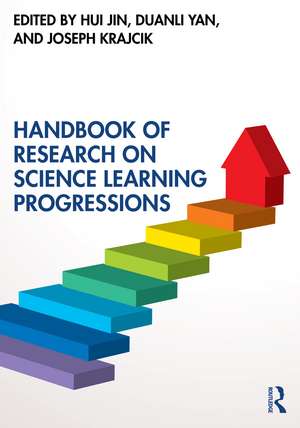Handbook of Research on Science Learning Progressions
Editat de Hui Jin, Duanli Yan, Joseph Krajciken Limba Engleză Paperback – 30 iul 2024
Researchers and educators have used learning progressions to guide the design and alignment of curriculum, instruction, and assessment, and to help students learn scientific knowledge and practices in a coherent and connected way across multiple years. This handbook lays out the development and current state of research in this field across four sections: learning progression theories and methodologies; learning progressions to promote student learning; teachers’ learning and use of learning progressions; and new technology in learning progression research.
Featuring internationally-recognized experts in learning progression research as well as up-and-coming voices, the Handbook of Research on Science Learning Progressions offers a defining new resource for researchers, teachers and teacher educators, and curriculum and assessment developers in science education.
| Toate formatele și edițiile | Preț | Express |
|---|---|---|
| Paperback (1) | 745.22 lei 6-8 săpt. | |
| Taylor & Francis – 30 iul 2024 | 745.22 lei 6-8 săpt. | |
| Hardback (1) | 1814.82 lei 6-8 săpt. | |
| Taylor & Francis – 30 iul 2024 | 1814.82 lei 6-8 săpt. |
Preț: 745.22 lei
Preț vechi: 908.80 lei
-18% Nou
Puncte Express: 1118
Preț estimativ în valută:
142.59€ • 148.89$ • 117.75£
142.59€ • 148.89$ • 117.75£
Carte tipărită la comandă
Livrare economică 15-29 aprilie
Preluare comenzi: 021 569.72.76
Specificații
ISBN-13: 9780367773182
ISBN-10: 036777318X
Pagini: 554
Ilustrații: 146
Dimensiuni: 178 x 254 mm
Greutate: 0.95 kg
Ediția:1
Editura: Taylor & Francis
Colecția Routledge
Locul publicării:Oxford, United Kingdom
ISBN-10: 036777318X
Pagini: 554
Ilustrații: 146
Dimensiuni: 178 x 254 mm
Greutate: 0.95 kg
Ediția:1
Editura: Taylor & Francis
Colecția Routledge
Locul publicării:Oxford, United Kingdom
Public țintă
Postgraduate, Professional, and Undergraduate AdvancedCuprins
1. An Introduction to Science Learning Progression Research Section 1: Learning Progression Theories and Methodologies 2. Cognitive Foundations of Science Learning Progressions 3. On the Critiques of the Learning Progression Research 4. Validity of learning progressions 5. Development and Validation of Knowledge-In-Use Learning Progressions 6. Coordinating Assessments with a Learning Progression 7. Learning Progression Approaches Used in Germany 8. Learning Progression Approaches Used in China 9. Implications of Mathematics Learning Trajectories for Science Education 10. Commentary: Perspectives on Learning Progression Theories and Methodologies Section 2: Learning Progressions to Promote Student Learning 11. Learning Progressions in Genetics 12. Developing Three-Dimensional Learning Progressions of Energy, Interaction, and Matter at Middle School Level: A Design-Based Research 13. Rethinking Learning Progression for Energy 14. Geology & Earth Systems Sciences Learning Progressions 15. Supporting Curriculum Development with a Learning Progression for Matter-tracing Investigations 16. Using a Learning Progression to Assess and Scaffold Students’ Explanations of Carbon-transforming Processes 17. Commentary: Reflection on the Learning Progression Approach to Promoting Student Learning Section 3: Curriculum, Instruction, and Teacher Learning 18. Key Components of Learning Progression-Based Educative Curriculum Materials Designed to Support Teachers and Their Diverse Students 19. Crosscutting Concepts and Learning Progressions 20. Science Teacher Educators and Science Teacher Learning Progressions: Resource, Roadmap, and Representation 21. Learning progressions as supports for teachers' formative assessment practices 22. Using learning progressions in professional development programs 23. Learning Progressions and Youths’ Rightful Presence in Science 24. Commentary: Implications of Teachers’ Learning and Use of Learning Progressions Section 4: Applications of Innovative Technology and Artificial Intelligence to Support Learning Progressions 25. Dynamic Bayesian Models for Learning Progressions 26. The Application of Automated Scoring Technology in Learning Progression Assessment 27. Integrating Artificial Intelligence into Learning Progression to Support Student Knowledge-in-Use: Opportunities and Challenges 28. Using an AI-based dashboard to help teachers support students’ learning progressions for science practices 29. Commentary: The role of technology in science learning progression
Notă biografică
Hui Jin is an associate professor of science education at Georgia Southern University, USA.
Duanli Yan is the Director of Computational Research at ETS and adjunct professor at Fordham University, USA.
Joseph Krajcik directs the CREATE for STEM Institute and is a University Distinguished Professor at Michigan State University, USA.
Duanli Yan is the Director of Computational Research at ETS and adjunct professor at Fordham University, USA.
Joseph Krajcik directs the CREATE for STEM Institute and is a University Distinguished Professor at Michigan State University, USA.
Descriere
Gathering contributions from leading scholars around the world, this handbook offers a comprehensive resource on the most recent advances in research surrounding the theories, methodologies, and applications of science learning progressions.
